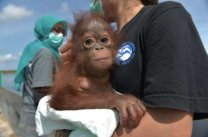Pet Orangutan

In the wild, infant chimpanzees and orangutans nurse on their mothers for up to six years. They are carried constantly the first year on their mother’s body, and they stay with their mothers until they are eight or nine years old. They learn all the necessary behaviors, protocols and skills that they need to interact with other chimpanzees in their social groups. They form life-long bonds with their mothers and other apes in their families.
But, when breeders sell chimpanzees or orangutans as exotic pets, they are always removed from their mothers while still tiny infants, within months of birth, so that the human owners can “bond” with their pets and have more control over them at a younger age and smaller size. Their owners keep them in their homes and treat them like human babies. They become little pseudo-humans and are, at first, very entertaining for the human family and their friends.
Apes Grow to be Large and Strong
But when these human-like pets begin to grow, they become extremely strong with an intelligent mind of their own. And then the trouble starts for the family. These hand-raised apes are used to living in a house in the company of their human family and become very unhappy being suddenly restricted full-time to a cage. When the reality hits the owners that it is extremely difficult and dangerous to keep a super-strong, 150 to 200-pound adult ape in the confines of a private home, they are suddenly and desperately looking for someone else to take on the care and responsibility of their once-beloved “son” or “daughter.”
Where These Discarded “Pets” Go
When these ex-pet chimpanzees are sent away to breeders, roadside zoos, or sanctuaries they often have serious problems dealing with other chimps and even recognizing that they themselves are not humans, but apes. Ex-pet chimpanzees have the most trouble interacting with their own species when they’ve been raised alone in a home because they have not learned the necessary behaviors and protocols to interact with their own species.
Since great apes can live in captivity over 50 years, the long-term financial commitment for the sanctuary accepting these former exotic pets is a huge responsibility (approximately $20, 000 a year), and rarely do their original owners share the burden of costs.
Related posts:










